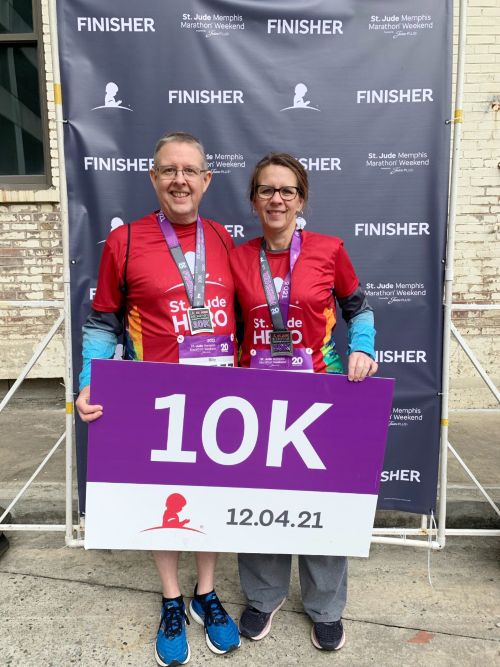Preventing Diabetes as a Childhood Cancer Survivor

Carson and his wife, Kimberly, enjoy taking walks and spending time outdoors.
Two doctors told Billy Carson the same thing. If his health habits did not improve, he would likely develop type 2 diabetes.
Carson, 54, heard that message from both his primary health care provider and a physician at St. Jude Children’s Research Hospital who sees him as part of the St. Jude Lifetime Cohort Study (St. Jude LIFE). St. Jude LIFE is a study of long-term survivors of childhood cancer.
“I thought, ‘OK. Now it’s getting serious. I’ve got to try to do something,” Carson says.
That was about 5 years ago. Carson’s blood sugar levels were high. He was overweight and not physically active.
Carson, 54, had acute lymphoblastic leukemia (ALL) more than 40 years ago. He is at risk for chronic health problems because of chemotherapy and radiation. Diabetes would add to his health risks.
What is diabetes?
Diabetes is a health condition that affects how your body turns food into energy. Your body breaks down most food into sugar (glucose). It releases sugar into your bloodstream. When your blood sugar level increases, your body tells your pancreas to release insulin. Insulin lets sugar into your body’s cells for use as energy.
A recent St. Jude LIFE study found that childhood cancer survivors are 3 times more likely to develop type 2 diabetes than their siblings.
When you have diabetes, your body does not make enough insulin or cannot use it as well as it should. Too much sugar stays in your bloodstream. Over time, that can cause serious health problems, such as heart disease, vision loss, and kidney disease.

The Carsons like to stay active even on vacation.
Diabetes prevention is possible
There is no cure for diabetes. But losing weight, eating healthy food, and being active can help.
Carson, an economics and accounting professor, joined a healthy lifestyle program offered through his health insurance company. He changed how he thought about food and physical activity. He has learned how to wait to eat until he is hungry. He has trained himself to eat slowly. He has found ways to add exercise to his daily routine.
“I just think eating healthy, being active, and watching things like sugars, salts, and fats is important,” Carson says. “I think my quality of life is so much better than it would have been had I not decided to make that choice. If I’m going to be a grandparent someday, I want to be a healthy grandparent.”

The Carsons trained and run a 10K.
How to prevent diabetes
Since he changed his lifestyle, Carson has lost weight and feels better. Here are some tips that have worked for him:
- Be active: Carson tries to walk 5,000 steps a day. He takes the stairs at work. He and his wife often walk at a park near their house. When on vacation, they look for ways to be active, such as kayaking, canoeing, and hiking.
- Do not buy junk food: Do not supply your kitchen with unhealthy foods. “If it is not in my pantry, I cannot eat it!” Carson says.
- Eat fresh: Carson tries to eat fresh fruits and vegetables at meals. He limits processed foods.
- Drink water and say “no” to soda: Carson mixes 1 part orange juice with 7 parts water to drink. It reduces sugar cravings and keeps him hydrated.
- Lower your sugar intake: Carson eats fruit when he wants something sweet. He also keeps a bag of dark chocolate candy at work. When he wants candy, he puts a chocolate in his mouth and lets it melt slowly.
Carson says to take one day at a time when making changes to your life.
“Living healthy can be a struggle at times, and each day we have to choose to live healthy,” Carson says. “If we fail today, tomorrow is a new day to start again.”
For more information on healthy living, visit the Together by St. Jude™ online resource.





